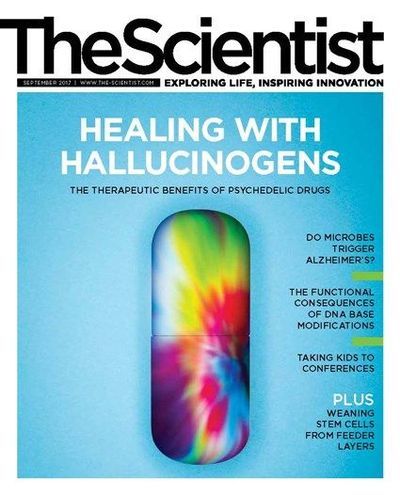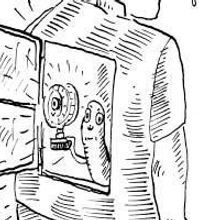Login
SubscribeCover Story

Decoding the Tripping Brain
Diana Kwon | Sep 1, 2017 | 10+ min read
Scientists are beginning to unravel the mechanisms behind the therapeutic effects of psychedelic drugs.
Features

Do Microbes Trigger Alzheimer’s Disease?
Jill U. Adams | Sep 1, 2017 | 10 min read
The once fringe idea is gaining traction among the scientific community.

The Role of DNA Base Modifications
Skirmantas Kriaucionis | Sep 1, 2017 | 10+ min read
Researchers are just beginning to scratch the surface of how several newly recognized epigenetic changes function in the genome.
Contributors
Contributors
Contributors
Meet some of the people featured in the September 2017 issue of The Scientist.
Editorial
Far-Out Science
Far-Out Science
How psychedelic drugs and infectious microbes alter brain function
Speaking of Science
Notable Science Quotes
Notable Science Quotes
Wildebeest, science advice for Trump, antibiotics, and more
Notebook
Bees Live the City Life in Detroit
Bees Live the City Life in Detroit
Important pollinators under threat from habitat destruction, bumblebees may find refuge on vacant land throughout Michigan’s largest metropolis.
A Bacteria-Laden Shirt That Ventilates in Response to Sweat
A Bacteria-Laden Shirt That Ventilates in Response to Sweat
Exposure to the body’s humidity causes a film of the microbes to change shape, opening flaps in the garment to allow for increased airflow.
A Prosthetic Advantage?
A Prosthetic Advantage?
Scientists are analyzing how factors such as the length and stiffness of artificial limbs affect performance in athletes with amputations.
How Microbes May Influence Our Behavior
How Microbes May Influence Our Behavior
Researchers are piecing together the links between the gut microbiome and mental health.
Critic at Large
Opinion: Understanding and Coping With Rising Publication Costs
Opinion: Understanding and Coping With Rising Publication Costs
As article processing charges top $5,000 at some research journals, authors and institutions have means of negotiating better deals or finding less expensive options.
Modus Operandi
Bubbles for Broken Bones
Bubbles for Broken Bones
Ultrasound-stimulated microbubbles enable gene delivery to fix fractures.
The Literature
Researchers Identify Clue to Asymmetric Cell Division
Researchers Identify Clue to Asymmetric Cell Division
Phosphorylation of a surface protein on endosomes is key to the organelles’ uneven distribution in daughter cells.
How Immune Receptors Got into Mouse Noses
How Immune Receptors Got into Mouse Noses
A study traces proteins’ evolution from the immune to the olfactory system.
Fish Smell ATP to Find Food
Fish Smell ATP to Find Food
Sensory neurons in the tip of the zebrafish nose respond to molecular signals released from food sources.
Profile
Motor Man
Motor Man
Ron Vale has spent a career studying how molecular motors transport cargo within cells. He’s also developed tools to help scientists communicate their findings.
Scientist to Watch
Kate Rubins Was the First to Sequence DNA in Space
Kate Rubins Was the First to Sequence DNA in Space
The virologist turned NASA astronaut pioneered DNA sequencing in space and conducted experiments in microgravity.
Lab Tools
Ready, Set, Grow
Ready, Set, Grow
How to culture stem cells without depending on mouse feeder cells
Careers
Baby on Board
Baby on Board
Many scientific conferences offer child care options that allow researchers to bring their families along for the trip.
Reading Frames
CRISPR May Prove Useful in De-Extinction Efforts
CRISPR May Prove Useful in De-Extinction Efforts
Researchers are using the powerful gene-editing tool to recreate the woolly mammoth.
Foundations
Discovery of the Malaria Parasite, 1880
Discovery of the Malaria Parasite, 1880
Most didn’t believe French doctor Charles Louis Alphonse Laveran when he said he’d spotted the causative agent of the disease—and that it was an animal.


















